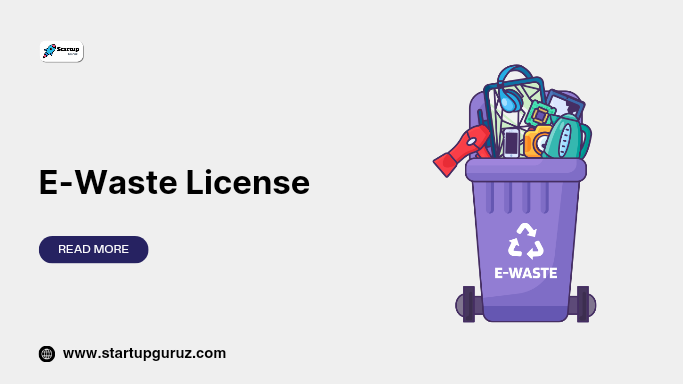E-Waste License
1. Introduction to E-Waste Licensing
E-waste licensing refers to the process of obtaining legal authorization to engage in the collection, transportation, storage, recycling, or disposal of electronic waste (e-waste). These licenses are aimed at regulating and managing the handling of e-waste to minimize environmental pollution and health hazards.

2. Importance of E-Waste Licensing
E-waste licensing plays a crucial role in:
- Ensuring proper management and disposal of hazardous e-waste materials.
- Promoting environmentally sustainable practices in the electronics industry.
- Protecting public health and safety from the harmful effects of e-waste contamination.
- Facilitating the recycling and recovery of valuable resources from electronic devices.
3. Types of E-Waste Licenses
Depending on the activities involved in e-waste management, different types of licenses may be required, including:
- Collection License: Authorizes the collection of e-waste from consumers or businesses.
- Transportation License: Permits the transportation of e-waste from collection points to recycling facilities.
- Recycling License: Allows the recycling, dismantling, or refurbishment of e-waste materials.
- Disposal License: Authorizes the proper disposal or treatment of e-waste residues.
4. Legal Framework for E-Waste Licensing
E-waste licensing is governed by national or regional regulations, as well as international conventions and agreements. These laws establish standards for e-waste management practices, licensing requirements, and enforcement mechanisms to ensure compliance with environmental and health standards.
5. Eligibility Criteria for E-Waste License
To qualify for an e-waste license, applicants typically need to meet certain eligibility criteria, which may include:
- Demonstration of technical competence and expertise in e-waste management.
- Compliance with environmental and occupational health regulations.
- Adequate infrastructure and facilities for e-waste handling, storage, and processing.
- Financial stability and liability insurance coverage.
6. Application Process for E-Waste License
The application process for an e-waste license involves several steps, including:
- Submission of a formal application to the designated regulatory authority.
- Providing detailed information about the proposed e-waste management activities, facilities, and personnel.
- Conducting site inspections and environmental impact assessments, if required.
- Payment of application fees and compliance with documentation requirements.
- Review and approval of the license application by the regulatory authority.
7. Compliance and Renewal Requirements
Once granted, e-waste licenses are subject to ongoing compliance and renewal requirements, which may include:
- Regular reporting of e-waste management activities and data.
- Maintenance of adequate records and documentation.
- Compliance with waste disposal, recycling, and environmental protection standards.
- Renewal of the license periodically, typically every one to three years, depending on the regulatory framework.
8. Benefits of E-Waste Licensing
E-waste licensing offers several benefits, including:
- Improved environmental sustainability through proper e-waste management practices.
- Protection of public health and safety from hazardous e-waste materials.
- Promotion of responsible recycling and resource recovery efforts.
- Creation of employment opportunities in the e-waste management sector.
- Enhanced corporate social responsibility and reputation for businesses.
9. Challenges and Considerations
Despite its benefits, e-waste licensing may pose challenges and considerations, such as:
- Complex regulatory requirements and compliance obligations.
- Limited enforcement capacity and resources in some regions.
- Lack of awareness and education about e-waste management among stakeholders.
- Technological advancements leading to increased e-waste volumes and diversity.
- Need for international cooperation and coordination to address global e-waste challenges.
10. FAQs on E-Waste License
Q1: Who needs to obtain an e-waste license? A1: Any individual or entity involved in the collection, transportation, recycling, or disposal of e-waste may need to obtain an e-waste license, depending on the jurisdiction and activities involved.
Q2: What are the consequences of operating without an e-waste license? A2: Operating without an e-waste license may result in legal penalties, fines, and regulatory sanctions, as well as reputational damage and loss of business opportunities.
Q3: How long does it take to obtain an e-waste license? A3: The timeline for obtaining an e-waste license varies depending on the regulatory authority, the complexity of the application, and the completeness of documentation.
Q4: Can e-waste licenses be transferred or assigned to other entities? A4: E-waste licenses are typically non-transferable and non-assignable, and any change in ownership or control of the licensed entity may require approval from the regulatory authority.
Q5: Are there any exemptions or waivers available for small-scale e-waste handlers? A5: Some jurisdictions may offer exemptions or waivers for small-scale e-waste handlers or community-based recycling initiatives, subject to certain conditions and criteria.
Q6: What are the environmental benefits of e-waste recycling? A6: E-waste recycling helps conserve natural resources, reduce energy consumption, and minimize pollution from hazardous materials, contributing to environmental sustainability and climate action.
Q7: How can businesses ensure compliance with e-waste licensing requirements? A7: Businesses can ensure compliance by familiarizing themselves with applicable regulations, implementing robust e-waste management systems, training personnel, and conducting regular audits and inspections.
Q8: What are the costs associated with obtaining and maintaining an e-waste license? A8: The costs associated with e-waste licensing include application fees, renewal fees, compliance costs, insurance premiums, and investments in infrastructure and technology for e-waste management.
Q9: Are there any international agreements or conventions addressing e-waste management? A9: Yes, international agreements such as the Basel Convention and the Stockholm Convention address e-waste management and the transboundary movement of hazardous wastes.
Q10: How can consumers contribute to responsible e-waste management? A10: Consumers can contribute by reducing e-waste generation through responsible consumption and disposal practices, participating in e-waste recycling programs, and supporting initiatives that promote e-waste awareness and education.
11. Conclusion
E-waste licensing plays a crucial role in promoting responsible and sustainable management of electronic waste, safeguarding the environment, and protecting public health and safety. By adhering to regulatory requirements, adopting best practices, and embracing innovation, stakeholders can contribute to a circular economy where e-waste is minimized, recycled, and repurposed for the benefit of society and the planet. Stay informed, stay compliant, and join the global effort to tackle the growing challenge of e-waste management.